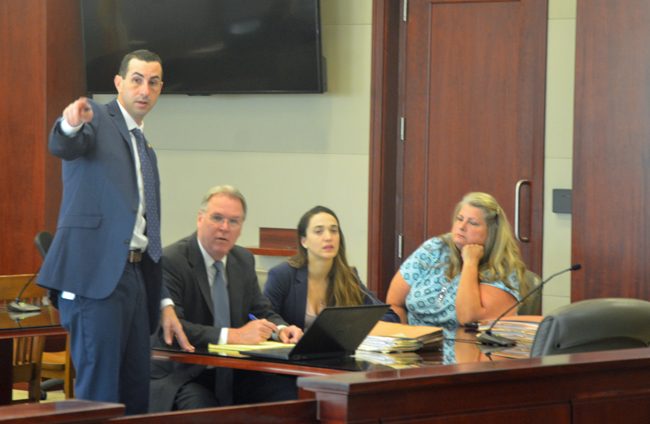
There’s been so many twists, turns, reversals, dismissals and continuances in the three years since the state brought a felony case against ex-Supervisor of Elections Kimberle Weeks that, unsurprisingly, yet another twist almost derailed the first day of trial today, a day entirely devoted to jury selection. The twist was a last-minute, one-word change in the prosecution’s wording of the case against Weeks.
Weeks faces nine third-degree felony counts of illegally recording conversations, and in one case disseminating a recording. All but one of the conversations involved local and state public officials Weeks recorded during phone conversations, allegedly without the individuals’ consent. The conversations were not in the context of public meetings. (Several counts along those lines were dismissed.)
The week-long jury trial is to finally decide whether Weeks acted illegally or whether the recordings fall within permissible exceptions to the law prohibiting recordings without the consent of the parties involved at both ends of the conversation. Today, Assistant State Attorney Jason Lewis, who is prosecuting the case, filed an amended list of charges, changing the technical wording from “interception of oral communication” to “interception of wire communication.” The change appears innocuous. It isn’t. Under Florida law, while it is prohibited to record oral communications without the parties’ knowledge, the prohibition doesn’t apply to “any public oral communication uttered at a public meeting or any electronic communication.”
Weeks’s defense is depending on that exception to buttress its claim that her recordings involved public officials in the conduct of public business. The “wire communication” section of law makes no such exceptions, presuming that wire communications are typically by phone. The rewording, in other words, would have enabled the prosecution to erase a key part of the defense’s strategy.
But it didn’t work. “If you want to do wire you can do wire all you want,” Circuit Judge Margaret Hudson told Lewis, extrapolating from an appeals court decision, “but wire is going to include the ability to have the exceptions.” Lewis argued repeatedly that the judge was essentially saying that the distinction in law was irrelevant, which could not have been the intention of lawmakers otherwise they would not have written in two sections of law. Hudson merely replied, repeatedly, that she was reaching her conclusion based on a decision that has not been overturned since. Her decision nevertheless left Lewis perplexed, slouching as it did closer to making law than interpreting it. As Lewis put it during a sidebar at the end of the day, when the matter flared again, “the law that we’re going on is not necessarily what we perceive it to be going in.”

The wording change, in effect, amounted to nothing on its face, but the arguments surrounding it hinted at some of the strategies ahead. In that sense, it was a small victory for the defense, which appears to be angling for exoneration based on exceptions to the law.
The argument developed at midday, two hours into jury selection. It took up about an hour, not counting lunch. But it proved a small diversion overall. What had been expected to be a tortuous jury-selection day proved to go more smoothly–more like the usual sort of day-long jury selection for any trial. Normally, some 150 potential jurors are summoned, out of which a third show up, out of which six are chosen for a trial.
This time, because of the endless publicity the Weeks case has drawn, the court summoned 500 potential jurors, fearing that most would be disqualified. Some 168 showed up. But only the first pool of 50 potential jurors proved necessary: by 4 p.m., a jury of four women and two men (at least one of them a minority, possibly two) was seated.
Selection had been largely unremarkable, with the usual batch of jurors doing their best to be excused up front.Excuses included job demands, scheduled surgery, difficulties traveling across town without a car, and in one case, guests coming in from out of town Wednesday. Others were weeded out progressively as they answered methodical questions, first by the judge, then by Lewis, then by Kevin Kulik, Weeks’s attorney. Weeks throughout, wearing a blue dress and sitting next to Kulik’s partner, Ashley Kay, seemed engrossed in the process throughout. An obsessive note-taker, Weeks seemed to have pen to paper most of the time. There’s no way to know if she was recording the proceedings: it would be entirely permissible (and far less expensive than requesting transcripts or recordings from the court.)
If there were some surprises during voir dire, the French-termed process of jury selection (the term originates from the Latin for telling the truth), one may have been the dearth of potential jurors who either knew Weeks by name or reputation, or who knew anything at all about her case. Several said they’d read about the case in the press, but no more than about 10 out of the 50 present.
Secondly, the courtroom was also void of anyone but potential jurors, three reporters, a newspaper photographer for the first hour of the trial, and an attorney from the county attorney’s office–Sean Moylan, who has kept tabs on the case for most of its development on the county’s behalf. The reason: County Attorney Al Hadeed and County Commissioner Charlie Ericksen are witnesses on the defense’s list, and it was their recorded conversation that originated the case, even though that count has been dismissed.
Potential jurors’ understanding of the law and jurors’ roles–or lack thereof–was less surprising.
As Kulik asked his questions, a few jurors proved skeptical of the defense if it did not present evidence, if the defendant was not put on the stand, and in some cases, if the defense did not prove its client’s innocence. “Depending on the situation, it could be negative,” one potential juror said, explaining why he thought he’d find it odd if the defense did not present some evidence before he could find someone not guilty. Only when pressed on the point did the potential juror retrace his steps.
“I want to know whether my doubts are reasonable or not so I’d want to hear from both sides,” another said. “I’d be more inclined with no exculpatory evidence to go with their case,” he said, in essence putting it on the defense to prove the client’s innocence.
“She’s here for a reason,” one juror said, revealing a common misconception that overwhelmingly favors the prosecution, however false: that if someone is on trial, the person must have done something wrong.
It was easy for the defense to dispense with those jurors.
Others–and more so as Kulik moved from juror to juror: they were clearly catching on–said they would not hold it against the defense if it either did not put on a case or prove its client’s innocence. “I’m a minority,” one said, “so nine times out of 10 we’re guilty until proven innocent, so I’m going to give her the benefit of the doubt,” he said, and look to the prosecution to prove its case.
Kulik described it as “about a half and half between jurors” who can go to a not-guilty finding without hearing from the defense, as opposed to those who won’t. But it was clear that several of those who felt they needed to hear from the defense did so not because they wanted to put the burden to prove innocence on the defense, but out of a customary sense of fairness: “I want to hear both sides,” one juror said.
Another said he’d give “more credibility” to law enforcement testimony “unless the defense could show me an exception.” One woman said outright that she would “100 percent” believe a police officer more readily than a lay person, echoing others’ presumptions. They would typically cite law enforcement’s “experience” or “training” with evidence and factual observations. In fact, and as has been richly documented, law enforcement testimony under oath is notoriously tendentious to the point that a term was coined to describe it: “testilying.”
The question is relevant in this case because a central witness will be Phil Lindley, the now-retired Florida Department of Law Enforcement agent who wrote and executed the search warrant on Weeks’s office when she was still the Flagler County supervisor of elections. The case against her sprang from that search. Weeks’s attorneys have tried in various ways to contest the validity of the warrant and the search. They failed.
After the jury was seated, the remaining pool of potential jurors dismissed, and the first day of trial set for 9 a.m. Tuesday, the defense moved for dismissal–a routine motion in all criminal cases, but one rarely granted. Hudson did not grant it in Weeks’s case, either. The trial will go on in Courtroom 401 at the Flagler County courthouse. It is expected to take the rest of the week.





























palmcoaster says
What a witch hunt against an honest lady, hard working, dedicated and knowledgeable SOE (Supervisor of Elections) constitutional official that won her re-election by a landslide never seeing in Flagler County before by any constitutional or other candidate.
The ridiculous accusation of recording illegally while communicating in a public building during public work has no basis, just a pay back for disclosing what could be just violating our elections laws by county officials and while asking the higher ups in Tallahassee for advise and resolution while disclosing the incidents.
This waste of our taxpayers funds is just so sitting officials and administrators can set a precedent to all future officials in the same seats to abide by the “code of silence” or pay a very high price.
Harold says
She needs jail time !!
Lou says
Every conversation on government property should be recorded and avoidable to the public. That would be positive step to reduce corruption in government.
Concerned Citizen says
The odds are against her with the numerous felony charges. It’s the oldest prosecution trick in history. I know I have a weak case so I will separate the charges. Then I can get her on at least one minor one and brand her a convicted felon.
Whether she is innocent or not she’s going to catch a felony rap. It’s going to be hard to find a non biased jury that hasn’t been instructed to find her guilty and a judge that doesn’t want to sentence her. The judges are all tight with the Commissioners. Defense should have requested a change of venue.
gmath55 says
500-some potential jurors. LOL. What a waste of time and money. Easy money for the Attorney’s.
palmcoaster says
Who need jail time in this county are all the drug users and dealers protected by their wealthy sugar daddies that bail them out and provide housing and transportation that bring delinquent traffic that looks like a McDonald’s take out window in and out the older man residence located in our communities, were minor children, students, elderly and single working mom’s with babies reside adjacent to them. Those are the one’s to be in jail and not former honest SOE Mrs Kimberle Weeks! Our taxes and law enforcement resources wasted on witch hunts instead!